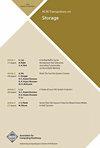Explorations and Exploitation for Parity-based RAIDs with Ultra-fast SSDs
IF 2.6
3区 计算机科学
Q3 COMPUTER SCIENCE, HARDWARE & ARCHITECTURE
引用次数: 0
Abstract
Following a conventional design principle that pays more fast-CPU-cycles for fewer slow-I/Os, popular software storage architecture Linux Multiple-Disk (MD) for parity-based RAID (e.g., RAID5 and RAID6) assigns one or more centralized worker threads to efficiently process all user requests based on multi-stage asynchronous control and global data structures, successfully exploiting characteristics of slow devices, e.g., Hard Disk Drives (HDDs). However, we observe that, with high-performance NVMe-based Solid State Drives (SSDs), even the recently added multi-worker processing mode in MD achieves only limited performance gain because of the severe lock contentions under intensive write workloads. In this paper, we propose a novel stripe-threaded RAID architecture, StRAID, assigning a dedicated worker thread for each stripe-write (one-for-one model) to sufficiently exploit high parallelism inherent among RAID stripes, multi-core processors, and SSDs. For the notoriously performance-punishing partial-stripe writes that induce extra read and write I/Os, StRAID presents a two-stage stripe write mechanism and a two-dimensional multi-log SSD buffer. All writes first are opportunistically batched in memory, and then are written into the primary RAID for aggregated full-stripe writes or conditionally redirected to the buffer for partial-stripe writes. These buffered data are strategically reclaimed to the primary RAID. We evaluate a StRAID prototype with a variety of benchmarks and real-world traces. StRAID is demonstrated to outperform MD by up to 5.8 times in write throughput.超高速ssd基于奇偶校验的raid的探索和开发
遵循传统的设计原则,即为更少的慢i / o支付更多的快速cpu周期,流行的软件存储架构Linux multi- Disk (MD)用于基于奇偶性的RAID(例如RAID5和RAID6)分配一个或多个集中的工作线程,以有效地处理基于多阶段异步控制和全局数据结构的所有用户请求,成功地利用慢设备(例如硬盘驱动器(hdd))的特性。然而,我们观察到,对于基于nvme的高性能固态驱动器(ssd),即使是最近在MD中添加的多工作者处理模式也只能获得有限的性能提升,因为在密集的写工作负载下存在严重的锁争用。在本文中,我们提出了一种新的条带线程RAID架构,StRAID,为每个条带写入分配一个专用的工作线程(一对一模型),以充分利用RAID条带、多核处理器和ssd之间固有的高并行性。众所周知,部分分条写入会导致额外的读/写I/ o,而StRAID提供了一个两阶段的分条写入机制和一个二维多日志SSD缓冲区。所有写操作首先在内存中分批处理,然后写入主RAID以进行聚合的全条带写操作,或者有条件地重定向到缓冲区以进行部分条带写操作。这些缓冲的数据策略性地回收到主RAID。我们使用各种基准测试和真实世界的跟踪来评估StRAID原型。在写入吞吐量方面,StRAID的性能比MD高出5.8倍。
本文章由计算机程序翻译,如有差异,请以英文原文为准。
求助全文
约1分钟内获得全文
求助全文
来源期刊

ACM Transactions on Storage
COMPUTER SCIENCE, HARDWARE & ARCHITECTURE-COMPUTER SCIENCE, SOFTWARE ENGINEERING
CiteScore
4.20
自引率
5.90%
发文量
33
审稿时长
>12 weeks
期刊介绍:
The ACM Transactions on Storage (TOS) is a new journal with an intent to publish original archival papers in the area of storage and closely related disciplines. Articles that appear in TOS will tend either to present new techniques and concepts or to report novel experiences and experiments with practical systems. Storage is a broad and multidisciplinary area that comprises of network protocols, resource management, data backup, replication, recovery, devices, security, and theory of data coding, densities, and low-power. Potential synergies among these fields are expected to open up new research directions.
 求助内容:
求助内容: 应助结果提醒方式:
应助结果提醒方式:


